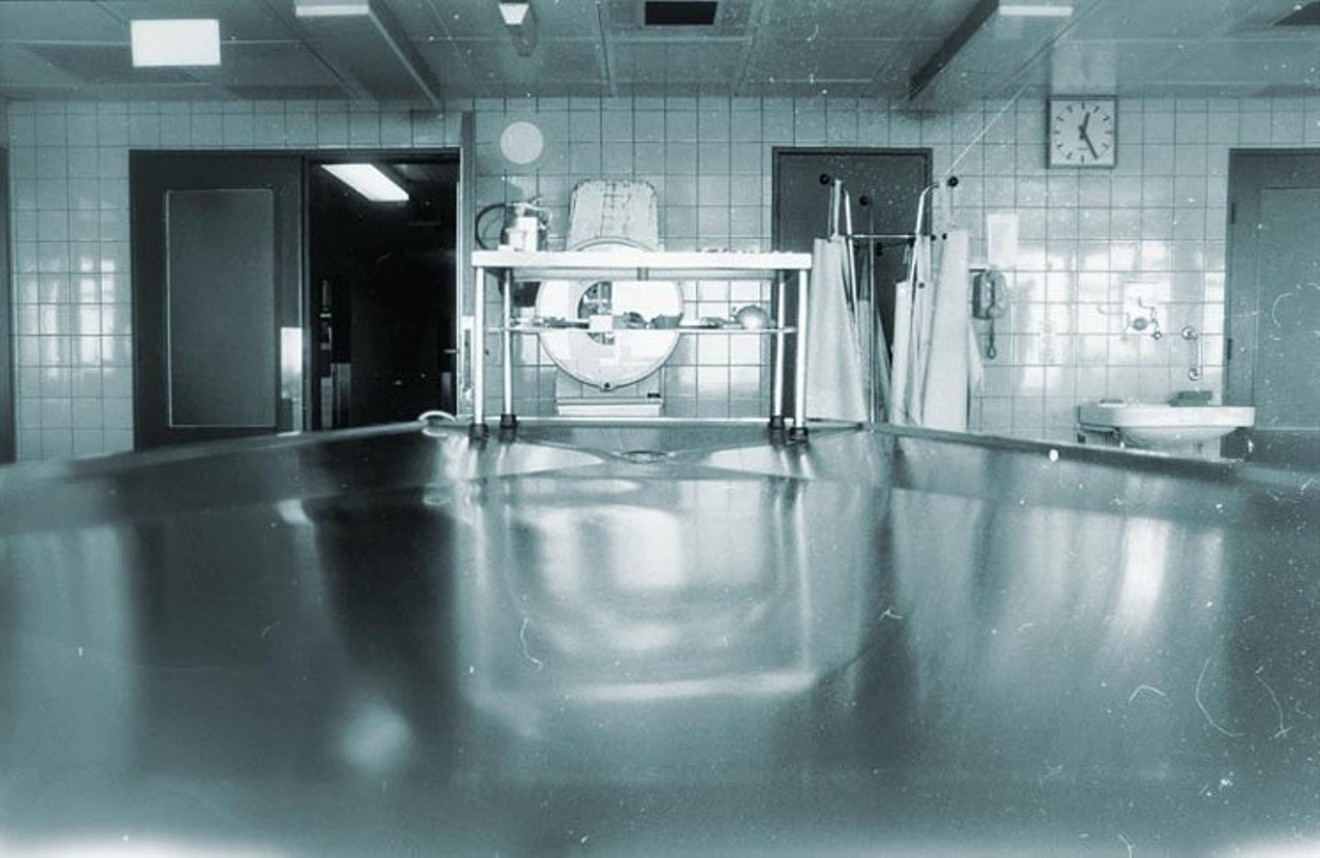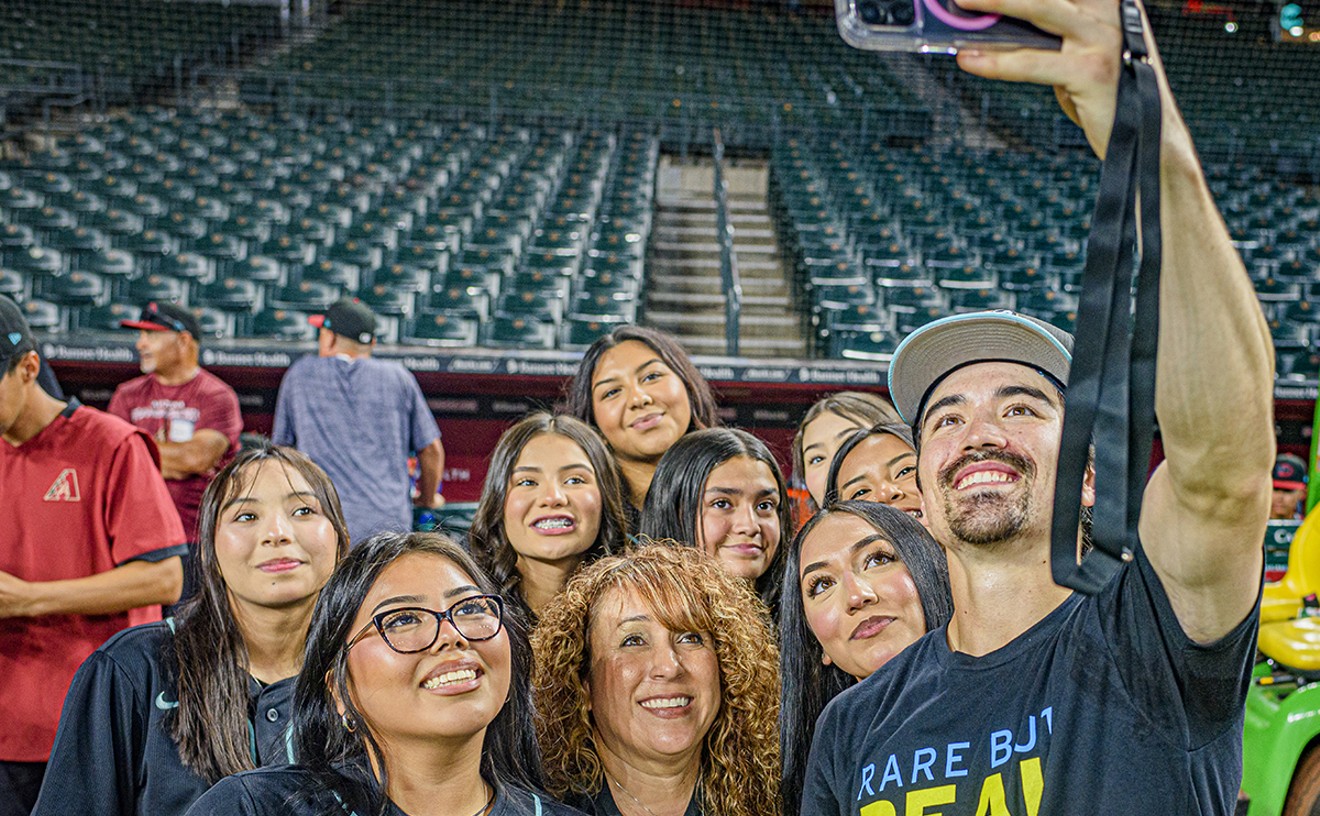The owner of a Phoenix body donation center where FBI agents found buckets of heads and a cooler of male genitalia will have to pay $58 million to 10 people who say they were conned into donating their loved ones' bodies to a company that dismembered and sold them for profit.
After five days of deliberations, a Maricopa County jury has decided Stephen Gore, the owner of the now-defunct Biological Resource Center, must pay $50 million in punitive damages and $8 million in compensatory damages. The verdict was read in Superior Court in downtown Phoenix at about 11 a.m. on November 19.
Ten of the 21 counts were found in favor of the defendants, and 11 in favor of the plaintiffs. Several of the original plaintiffs in the case reached out-of-court settlements before the trial began.
Michael Burg, the Colorado lawyer representing the plaintiffs, called the decision "a landmark verdict." Burg previously told Phoenix New Times the revelations in the case were emotionally devastating to family members of the deceased people, who often blamed themselves for falling for the center's scam.
"The FBI told people ... your person's body parts have been sold across the country," Burg said. "They can't stop thinking how their loved one's head is now in Florida. They were cut up like a piece of meat. It's despicable."
In January 2014, FBI agents raided the Biological Resource Center and found buckets full of body parts and a small woman's head sewn onto a large man's torso. The FBI ultimately found 10 tons of frozen human remains, including 281 heads, 337 legs, and 97 spines.
The criminal investigation into the center's activities began after U.S. Customs agents found a container full of 15 severed human heads on a Delta cargo flight.
Gore pleaded guilty to operating an illegal enterprise in 2015 and was sentenced to one year of deferred prison time and four years of probation.
After the raid, in 2015, family members who had donated their loved ones' bodies in the hopes of furthering medical research or assisting others sued Gore and his company in Maricopa County Superior Court.
The 21 plaintiffs alleged that the center lied to them about what their loved ones bodies' would be used for. According to the lawsuit, the bodies "were literally used as crash-test dummies, which meant they were used in experiments involving exposures to destructive forces, e.g. impacts, crashes, ballistic injuries and blasts."
One of the plaintiffs in the case, Jim Stauffer, donated the body of his mother, Doris, to the center after she died in 2013. She had suffered from Alzheimer's toward the end of her life, and Stauffer hoped that the donation could help find a cure for the debilitating disease.
But three years later, reporters for Reuters investigating the trade of human cadavers and body parts called Stauffer with disturbing news: The Biological Resource Center secretly had sold Stauffer's mother's body to the U.S. military for thousands of dollars, which in turn used her body for blast-testing experiments.
"She was then supposedly strapped in a chair on some sort of apparatus, and a detonation took place underneath her. To basically kind of get an idea of what the human body goes through when a vehicle is hit by an IED," Stauffer told ABC 15.
Stauffer said he had checked a box on a form explicitly stating that he would not allow his mother's body to be used for nonmedical purposes.
Ten days after he donated his mother's body, the center sent him his mother's cremated remains. Yet records reviewed by Reuters showed that someone from the center had detached one of his mother's hands and used that for cremation. Then, the Biological Resource Center sold the rest of her body to the military.
"Simply because a body has been dissected doesn't mean it hasn't been treated with dignity and respect," Gore's attorney, Timothy O'Connor said during the trial. "The handling was not outrageous or atrocious. It's what they do in this industry."
Burg said he hopes the case sets an example and "deters other body brokers" from operating as Gore did.
In response to the disturbing case of the Biological Resource Center, Arizona passed a law in 2017 requiring body donation companies to obtain a state license in order to operate in Arizona. But an investigation by the Arizona Republic found the law has yet to be implemented or enforced.
[
{
"name": "Air - MediumRectangle - Inline Content - Mobile Display Size",
"component": "18478561",
"insertPoint": "2",
"requiredCountToDisplay": "2",
"watchElement": ".fdn-content-body",
"astAdList": [
{
"adType": "rectangle",
"displayTargets": "mobile"
}
]
},{
"name": "Editor Picks",
"component": "16759093",
"insertPoint": "4",
"requiredCountToDisplay": "1",
"watchElement": ".fdn-content-body",
"astAdList": [
{
"adType": "rectangle",
"displayTargets": "desktop|tablet"
},{
"adType": "rectangle",
"displayTargets": "desktop|tablet|mobile"
}
]
},{
"name": "Inline Links",
"component": "17980324",
"insertPoint": "8th",
"startingPoint": 8,
"requiredCountToDisplay": "7",
"maxInsertions": 25
},{
"name": "Air - MediumRectangle - Combo - Inline Content",
"component": "16759092",
"insertPoint": "8th",
"startingPoint": 8,
"requiredCountToDisplay": "7",
"maxInsertions": 25,
"watchElement": ".fdn-content-body",
"astAdList": [
{
"adType": "rectangle",
"displayTargets": "desktop|tablet"
},{
"adType": "rectangle",
"displayTargets": "desktop|tablet|mobile"
}
]
},{
"name": "Inline Links",
"component": "17980324",
"insertPoint": "8th",
"startingPoint": 12,
"requiredCountToDisplay": "11",
"maxInsertions": 24
},{
"name": "Air - Leaderboard Tower - Combo - Inline Content",
"component": "16759094",
"insertPoint": "8th",
"startingPoint": 12,
"requiredCountToDisplay": "11",
"maxInsertions": 24,
"watchElement": ".fdn-content-body",
"astAdList": [
{
"adType": "leaderboardInlineContent",
"displayTargets": "desktop|tablet"
},{
"adType": "tower",
"displayTargets": "mobile"
}
]
}
]










